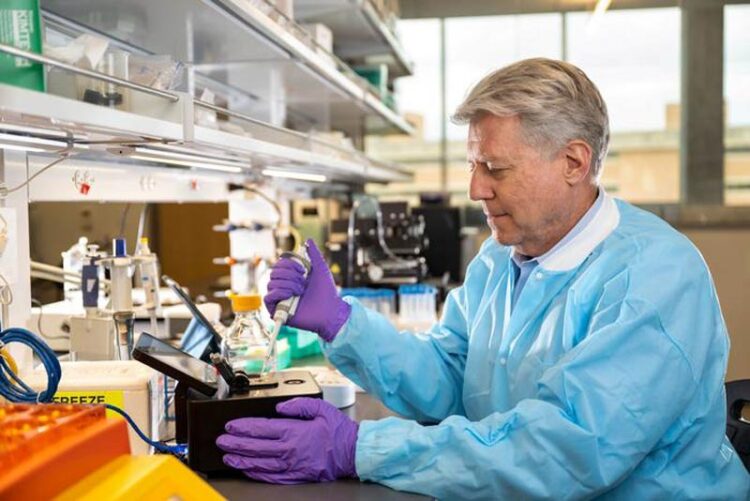Why cancer immunotherapies don’t work for everyone

Jon Weidanz, UTA associate vice president for research and innovation
Courtesy UT Arlington
UTA study could impact treatments for blood, colorectal and non-small cell lung cancers.
A multi-institutional study co-authored by University of Texas at Arlington scientists uncovered a mechanism by which cancer cells prevent the immune system from activating and attacking the cancerous invaders.
The study, published in the peer-reviewed journal Cell Reports, sheds light on why immunotherapy treatments don’t work for all people or all diseases. For example, certain types of cancers—including colon, pancreatic, prostate and brain cancers—have stubbornly resisted immunotherapy. And while breast, esophageal and head and neck cancers often respond favorably, sometimes the treatments don’t work as planned. Researchers still don’t understand exactly why.
“Immunotherapy is an incredibly promising new treatment avenue for cancer, but we still have work to do determining why it doesn’t work for all people or types of cancer,” said Jon Weidanz, UTA associate vice president for research and innovation.
He and Soroush Ghaffari, a UTA postdoctoral fellow, were co-authors of the study, along with colleagues at Leiden University in Leiden, Netherlands, and Karolinska University in Solna, Sweden. The team determined that a key checkpoint in the immune system—called NKG2A—doesn’t engage with its specific binding molecule expressed in cancer cells until the appropriate signal is received.
“The team reasoned that monotherapy agents targeting the NKG2A receptor may not be effective without receiving an inflammatory trigger,” Ghaffari said. “This might explain why drugs designed to bind to the NKG2A receptor to disrupt this immune checkpoint have been only effective when used in combination with other agents that can induce the necessary inflammatory signal.”
A second major finding of the study revealed how certain cancers can inhibit the immune system from activating its macrophages, which are specialized immune cells that play a critical role in eliminating diseased or damaged cells.
“These data give us a new molecular understanding of why some immunotherapies work and some don’t,” said Weidanz, who also is a professor kinesiology with an appointment in bioengineering and a member of the Multi-Interprofessional Center for Health Informatics. “These results will help us identify and treat more cancers effectively with immunotherapy, helping more people live longer lives despite a cancer diagnosis.”
These findings have implications for immune system research and the development of more effective immunotherapy drugs, said Kate C. Miller, vice president of research and innovation at UTA.
“These are exciting new research results that have the potential to impact people living with cancer,” Miller said. “This is another great example of the caliber of biomedical research we’re performing both here at UTA and with our partners at other institutions.”
Read the full study in Cell Reports.
Journal: Cell Reports
DOI: 10.1016/j.celrep.2023.113516
Method of Research: Experimental study
Subject of Research: Animals
Article Title: The MHC-E peptide ligands for checkpoint CD94/NKG2A are governed by inflammatory signals, whereas LILRB1/2 receptors are peptide indifferent
Article Publication Date: 26-Dec-2023
COI Statement: J.W. was co-founder and chief scientist at Abexxa Biologics, Inc., during the study and had ownership interest (including stock and patents) of Abexxa. J.W. is a consultant for Boehringer-Ingelheim International GmbH. T.v.H. reports receiving a commercial grant from Abexxa and was an advisory board member for the same.
Media Contact
Katherine Bennett
University of Texas at Arlington
katherine.bennett@uta.edu
All latest news from the category: Health and Medicine
This subject area encompasses research and studies in the field of human medicine.
Among the wide-ranging list of topics covered here are anesthesiology, anatomy, surgery, human genetics, hygiene and environmental medicine, internal medicine, neurology, pharmacology, physiology, urology and dental medicine.
Newest articles
Faster, more energy-efficient way to manufacture an industrially important chemical
Zirconium combined with silicon nitride enhances the conversion of propane — present in natural gas — needed to create in-demand plastic, polypropylene. Polypropylene is a common type of plastic found…

Energy planning in Ghana as a role model for the world
Improving the resilience of energy systems in the Global South. What criteria should we use to better plan for resilient energy systems? How do socio-economic, technical and climate change related…

Artificial blood vessels could improve heart bypass outcomes
Artificial blood vessels could improve heart bypass outcomes. 3D-printed blood vessels, which closely mimic the properties of human veins, could transform the treatment of cardiovascular diseases. Strong, flexible, gel-like tubes…





















